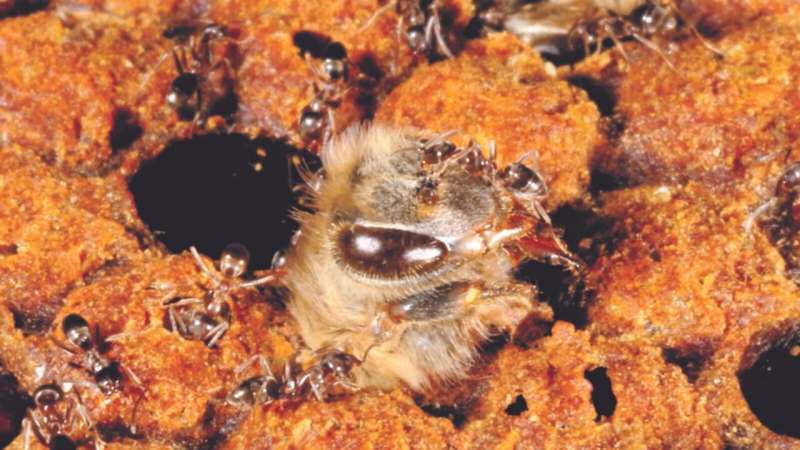This article has been reviewed according to Science X's editorial process and policies. Editors have highlighted the following attributes while ensuring the content's credibility:
fact-checked
peer-reviewed publication
trusted source
proofread
Ant raids are decimating honeybee colonies, says study

Researchers from the Victoria University of Wellington have demonstrated a link between invasive ant species and increased levels of diseases in bees.
Jana Dobelmann's research shows that when Argentine Ants invade bee colonies, there are higher levels of Deformed wing virus (DWV)—infamous for causing the death of millions of hives around the globe.
"Ants will raid beehives, kill off the bees, and take the honey—they're predators."
"But what we're also seeing is that even if the raid doesn't necessarily spell the end of a hive, it can still result in extremely high viral loads causing severe infections and stress for the bees."
Argentine Ants carry substantial levels of DWV, so Jana says it's possible that they're directly infecting the bees during a raid, or that the stress from the raid itself is inducing the higher infection loads.
Regardless, Jana says the effects of these ant invasions on local beehives can be deadly.
"DWV is one of the most dangerous pathogens affecting our bee colonies in New Zealand.
"It increases mortality, and high levels of infection can stunt a bee's wing growth or result in learning difficulties. Bees with severe infections contribute little to the colony, so they are shunned and tossed out of the hive by other bees where they are left to die."
Jana's supervisor, Professor Phil Lester says that New Zealand's native ants don't have the same effect on the bee population.
"We haven't seen native ants attacking beehives at all. Our research has only shown introduced species exhibiting this destructive behavior."
Argentine Ants were first found in New Zealand in the 1990s and have since spread around the country.
With honey worth hundreds of millions of dollars to the New Zealand economy, and critical to our nation's biodiversity, Professor Lester says more needs to be done.
"Currently, the only option available to beekeepers are pesticides that are widely toxic. Many beekeepers are forced to abandon apiary sites entirely—these ants and the viruses they spread are overwhelming.
"Shifting apiary sites can be a problem in itself though. If even a few ants are shifted with the apiary, you've just introduced the ants to a whole new area, and you'll likely see the same thing happen again."
Professor Lester says there's no silver bullet on the horizon. "We're looking at different ways of trying to control the effects of pathogens including DWV. One of our current projects is with immunotherapy—creating antibodies to try to cure or curtail this deadly virus in honey bees."
The research is published in the journal Biology Letters.
More information: Jana Dobelmann et al, An invasive ant increases deformed wing virus loads in honey bees, Biology Letters (2023). DOI: 10.1098/rsbl.2022.0416
Journal information: Biology Letters
Provided by Victoria University of Wellington



















